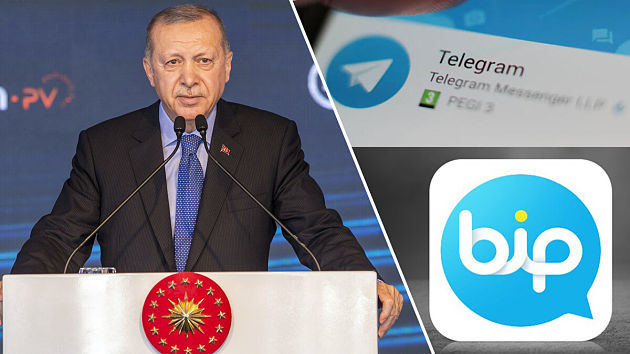Yesterday, Turkish President Recep Tayyip Erdogan created his official channel on the social network Telegram (https://t.me/RTErdogan) and in his very first post called on his readers to register on the Turkish messenger BIP. This happened against the backdrop of two events related to privacy and censorship on globally renowned social networks.
First, WhatsApp announced that it would share user data with the social network Facebook, with which it cooperates. Secondly, the social networks Facebook and Twitter deleted the accounts of the still serving US President Donald Trump and several of his prominent supporters, accusing them of inciting the riots at the US Capitol on January 6, 2021. In response, the social network Parler, to which disaffected individuals turned, faced intense pressure – its apps were removed from the App Store, and Amazon cut off its hosting, causing the network to go offline, and fearing reprisal, many of its employees began to resign. Such attacks on freedom of speech were not only condemned by Turkish President Recep Tayyip Erdogan, but also raised concerns among even skeptical European leaders, such as Emmanuel Macron and Angela Merkel, about Donald Trump. We would like to express our opinion on this matter.
It is important to distinguish between two things: on the one hand, the current issue in America related to the inauguration of the new president, Joe Biden, and the refusal of Trump and his supporters to recognize his victory, and on the other hand, the long-term issue of censorship and arbitrariness on social networks owned by private companies whose executives effectively impose their ideology on users worldwide. When we talk about blocking resources, in principle, such a procedure is possible in situations of threat to public security, court decisions, or when the danger is obvious and requires immediate intervention, such as broadcasts where people are being shot, and so on. Does what happened in America fall under these criteria, and if so, why didn’t Facebook and Twitter take similar action when violent anti-Trump protests occurred last year? These are interesting questions, but they do not concern us much.
It is a different matter when social networks, at their own discretion, delete pages and accounts, often with thousands or even millions of followers, because they find the publications or even the activities of their owners unacceptable. This happened long before the recent events in the United States, and there is no doubt that it will continue to happen. This raises the increasingly pertinent question of how we can protect the global information space, which seeks openness and the exchange of ideas and information, from the arbitrariness of corporations that clearly sympathize with one ideology and suppress its opponents.
The creation of Recep Tayyip Erdogan’s channel on Telegram should be evaluated from this perspective. After all, if Trump’s accounts and pages on Facebook and Twitter have been deleted today, there is no guarantee that his channels will not be deleted tomorrow under some pretext. And if this happens to presidents, what can we say about ordinary users?
Telegram, a social network that surpassed 500 million users this week against the backdrop of these events, is currently experiencing growth and serves as a refuge for those leaving Facebook and Twitter. But it also raises questions.
First, yes, its policies are currently more liberal, but Facebook and Twitter have not always been what they are now. And where is the guarantee that tomorrow, having replaced them as a monopoly, Telegram will not start imposing its own rules?
Second, the identity of Telegram’s creator and owner, Pavel Durov, raises suspicions among conspiracy-minded commentators. He previously created the Russian social network Vkontakte, which he was forced to sell to the FSB (Federal Security Service), after which he left Russia and created a global social network. However, there are those who see this as a “cover story” for Durov, and see him as an FSB agent carrying out its mission to create a Kremlin-controlled global alternative to Facebook and Twitter. This argument is supported not only by Durov’s background, but also by the favorable attitude of Kremlin propagandists who have been courting Telegram, as well as by the recent warming of relations with the Russian government, which has unblocked the messenger.
Finally, in this context, we should return to the issue of messengers and the confidentiality of information within them. We wrote about this in 2017, when this issue first arose (https://golosislama.com/news.php?id=33091), and we reiterate it now. If we talk about the exchange of confidential or even dangerous information, no messenger will provide you with confidentiality or security from the intelligence services, because even if they do not actively cooperate with them, they will be forced to provide information about you by court order, especially in cases related to terrorism, etc.
On the other hand, social networks function as media, providing an alternative to traditional media such as classical television. And in this context, the criterion for evaluating them can only be whether they ensure freedom of speech and competition of ideas, or whether they exercise strict ideological and political censorship. From this point of view, Telegram currently offers more freedom to the owners of its channels than Facebook and Twitter do to those who broadcast within them. However, as already mentioned, there is no guarantee that this situation will not change for the worse tomorrow. So abandoning all social networks for the sake of one is probably not the right solution either.
By creating a channel on Telegram, Recep Tayyip Erdogan did not close his pages and accounts on Facebook and Twitter; he simply created another backup platform. This is perhaps the most reasonable approach to this problem until clear and understandable rules are established for both users and owners of social networks on a global scale. If that ever happens.

